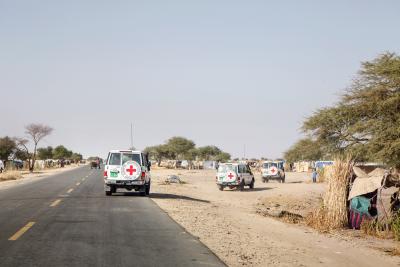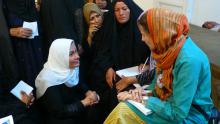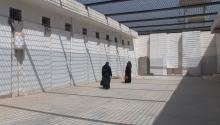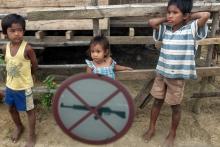Case prepared by Percy Carter, Natasha Divina Renzetti and Britta Sandmann, LL.M. students at Roma Tre University under the supervision of Giulio Bartolini (Professor of International Humanitarian Law), Laura Di Gianfrancesco (PhD Student), Roma Tre University IHL Legal Clinic.
A. HUMANITARIAN ASSISTANCE DELIVERED TO DETAINEES
Aid workers have travelled to a remote Niger rebel base, where 72 soldiers are being held, to deliver drugs and other humanitarian assistance.
Some of those captured were injured when Tuareg rebels attacked their military base on Friday.
The International Committee of the Red Cross team has travelled to Tizerzet in the Sahara desert, some 400km north of the nearest town, Agadez. A BBC reporter says locals are shocked that rebels captured so many troops. The BBC's Idy Baraou in Agadez says he saw four truckloads of aid, while ICRC officials said they were taking more. […]
Our reporter says it was Niger's biggest rebel attack since a rebellion first began in 1991. That uprising ended with a 1995 peace deal but earlier this year the MNJ [Mouvement des Nigériens pour la Justice] took up arms, saying the terms of that deal were not being implemented.
In April, the rebels, who say Tuaregs are marginalised by the government, attacked a uranium mine in northern Niger. The north of Niger is rich in uranium and the country is one of the world's top five uranium producers.
B. TREATMENT AND RELEASE OF FURTHER WOUNDED DETAINEES
Geneva (ICRC) – Today, 2 July 2007, the International Committee of the Red Cross (ICRC) completed the evacuation of 30 Forces Armées du Niger (FAN) personnel injured during armed clashes in the north of the country.
The ICRC was acting in its capacity of neutral intermediary, at the request of both the Mouvement des Nigériens pour la Justice (MNJ) and the FAN. All the casualties evacuated were taken to Arlit hospital, some 2,000 km north-east of the capital. An ICRC surgical team travelled to Arlit to treat them.
[…]
On 22 June, the ICRC was informed that clashes between the FAN and the MNJ in the far north-east of Niger had resulted in 72 FAN personnel being taken prisoner. Many of them were wounded and required medical and surgical treatment. Today, 30 of them were evacuated and received medical treatment, before being handed over to local authorities in Arlit.
These 30 individuals will soon be reunited with their families […].
[…]
The ICRC was able to conduct this operation thanks to the practical assistance, logistics support and personnel provided by the Red Cross Society of Niger, the French Red Cross, the Irish Red Cross Society, the International Federation of Red Cross and Red Crescent Societies and Médecins sans Frontières (both French and Swiss).
C. SERIES OF RELEASE OF FURTHER SOLDIERS DEPRIVED FROM THEIR LIBERTY BY MNJ IN 2007
[...]
August 2007
[...] MNJ released additional 6 soldiers held since June.
[...]
September 2007
[...] Tuareg-led rebels released 14 government soldiers to Libyan authorities 17 September in apparent Ramadan peace gesture […].
D. FURTHER AID AND RELEASE IN TUAREG CONFLICT
Geneva/Dakar (ICRC) – As part of its humanitarian work in the Republic of the Niger, the International Committee of the Red Cross (ICRC) sent staff to the Air region from 26 January till 1 February [2008].
In the course of their mission they visited 33 [remaining] persons, most of them members of Niger armed forces being held by the Mouvement des Nigériens pour la Justice (MNJ).
Under ICRC auspices, two detainees requiring urgent medical care were released and transferred to Arlit, where they were placed in the care of authorities.
During their visit ICRC Delegates spoke in private with the detainees and furnished medical aid as well as blankets, clothing, hygiene items, tea and sugar. The detainees were also able to speak with their families by means of a satellite telephone provided by the ICRC and were able to write Red Cross messages (brief personal messages to loved ones).
This ICRC mission was preceded by others in June and July of last year [2007], during which delegates had access to persons detained by the MNJ and facilitated the release of 34 of them […].
F. MNJ OATH ON QUR’AN TO REFRAIN FROM HARM
The most common approach to preventing violations is to demand that all fighters respect a code of conduct setting out the rules that the leaders consider essential.
[...]
Another example is that of the Mouvement des Nigériens pour la Justice (MNJ). During the 2007-2009 Niger conflict, all MNJ recruits were required to swear an oath on the Qur’an that included not harming civilians or damaging their possessions. There are real opportunities for humanitarians to have a positive impact on such measures, by persuading armed groups to adopt policies that are compatible with internationally recognised standards.
Discussion
I. Classification of the Situation and Applicable Law
1. How would you classify the situation in Niger in 2007? Was there an armed conflict? If yes, who were the Parties to it? What further information, if any, would you need in order to make such a determination? (
GCI-IV, Art. 3;
P II, Art. 1)
2. Which rules of IHL applied to the situation involving Niger and the Tuareg non-State armed group? Are non-State armed groups bound by IHL? (
GCI-IV, Art. 3;
P II, Art. 2)
II. Humanitarian Assistance and Release of Detainees
4. Should the Parties to a non-international armed conflict grant the ICRC access to visit the persons detained in the context of non-international armed conflict? To allow them to provide medical care to those who are wounded? To restore links between the detainees and their families? (
GCI-IV, Art. 3;
P II, Arts 5,
18;
CIHL, Rules 124-
126)
5. When shall the persons deprived of their liberty in a non-international armed conflict be released? (
CIHL Rule 128)
III. Elements Contributing to Respect for IHL
6. Can the involvement of a neutral intermediary such as the ICRC’s contribute to creating an environment conducive to the respect of IHL by the belligerents? How helpful can it be to have such an intermediary when it comes to the release of detainees?
7. Is there a military interest for non-state armed groups to have and enforce a code of conduct among its members? Can discipline enhance the efficiency and military capacities of a Party to the conflict?
8. (Document F) What is the significance of MNJ members pledging on the Qur’an in respecting the rules applicable to armed conflicts? What could be the relevance of religion and ethical values in facilitating compliance with IHL?
9. (Document C) Can the desire to reach peaceful solution to the conflict be a factor in complying with the law? Can such “peace gestures” enhance the political support of a Party to the conflict from the local population? By the international community?





